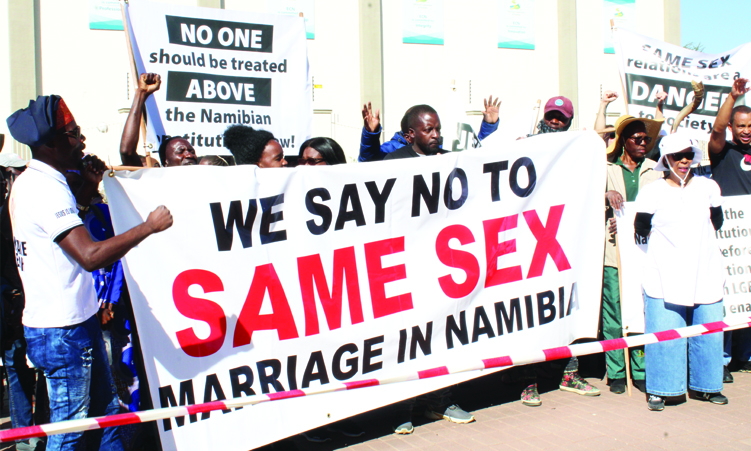The Ministry of Home Affairs, Immigration, Safety and Security says it will comply with a Supreme Court judgement on the recognition of same-sex marriages that was delivered last month.
The ministry’s executive director, Etienne Maritz, said in a statement yesterday that the government, and the ministry in particular, have taken note of the court’s judgement and acknowledges the independence of the courts and the finality of Supreme Court decisions.
“In the circumstances, the Ministry of Home Affairs, Immigration, Safety and Security will comply with the [Supreme Court’s] judgement accordingly,” Maritz stated.
The Supreme Court ordered on 16 May that the government, the minister of home affairs and Namibia’s immigration authorities must recognise two same-sex couples’ marriages that were lawfully concluded outside Namibia, in countries where same-sex marriage is legally recognised.
The court also declared that the non-Namibian partner in each of the two marriages is the spouse of the Namibian partner for the purposes of the Immigration Control Act, and declared that the adopted child of one couple is their dependent child, as envisaged in the Immigration Control Act.
The court’s judgement drew divergent reactions, with some critics denouncing the decision and others hailing it as an affirmation of the equal rights of sexual minorities under Namibia’s Constitution.
One of the lawyers of the two couples involved in the two cases on which the Supreme Court gave its ruling, Carli Schickerling, yesterday described the ministry’s decision as the right approach to take.
She said she was also hoping the ministry “will see the light and stop with future attempts to limit the rights of a part of our population”.
The secretary general of the Council of Churches of Namibia (CCN), Ludwig Beukes, yesterday said the Supreme Court’s decision was not welcomed and could not be taken lightly, and the council was not welcoming the ministry’s decision to comply with the court’s judgement.
Beukes said the CCN would remain hopeful that the court’s decision would be reconsidered.
“By listening to different voices, like the traditional leaders, some youth organisations and different organisations, it is clear that people are hoping a different outcome would be obtained through parliament. This is not something we would want to welcome in this country,” he said.
Gay rights activist and former Mr Gay Namibia Wendelinus Hamutenya yesterday said the ministry had no alternative but to abide by the court’s decision.
Hamutenya said there are still concerns from several anti-gay groups, including traditional leaders and political leaders, who Hamutenya said are spreading hatred against the gay community.
“We still want the abolishment of the sodomy law. Only then we will believe that the lesbian, gay, bisexual, transgender, queer and intersex (LGBTQI+) community is well protected,” Hamutenya said.
COURT’S REASONS
The five judges who heard the appeal reached a split decision, with four of the judges – including chief justice Peter Shivute and deputy chief justice Petrus Damaseb – agreeing on a majority judgement, while appeal judge Sylvester Mainga issued a dissenting judgement.
The court concluded that the home affairs ministry’s refusal to recognise same-sex marriages validly concluded outside Namibia infringed on such couples’ constitutional rights to dignity and equality.
The ministry’s stance had the effect that the non-Namibian partners of the two couples who sued the government were required to obtain permits allowing them to live in Namibia with their Namibian partners – a requirement the ministry does not extend to non-Namibian partners in different-sex marriages with Namibian citizens.
In its majority judgement, the court also relied on a common-law principle that marriages concluded in another country in accordance with the laws of that country should be recognised in Namibia.
In his dissenting judgement, Mainga said there are exceptions to the common-law rule that the court mentioned in its majority judgement, and said Namibia was under no obligation to recognise a marriage inconsistent with its policies and laws.
Mainga also acknowledged that the laws of Namibia discriminate against same-sex relationships, but added this was an issue that, in his view, the country’s parliament, and not the court, was best placed to assess and respond to.
In the statement issued yesterday, Maritz also said the ministry “is engaged in consultations with relevant key stakeholders regarding any other legal implications” that may arise from the Supreme Court’s judgement.
The ministry would address such implications once the consultations are completed, he said.
- Additional reporting Werner Menges
Stay informed with The Namibian – your source for credible journalism. Get in-depth reporting and opinions for
only N$85 a month. Invest in journalism, invest in democracy –
Subscribe Now!






